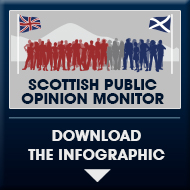Support for independence continues to fall as Labour narrows gap with SNP
 Among those certain to vote in the 2014 referendum, 30% agree that Scotland should be an independent country, down five percentage points since our last poll in June and nine points since January. Support for the Union has increased, as 58% of Scots said they would vote ‘No’ in the referendum, an increase of three points since June and eight points since January. Just over one in ten Scots are undecided (12%), which is up two points since June.
Support for independence is highest among those living in Scotland’s most deprived areas (43%), men (37%) and those aged 35-54 (35%). Conversely, women (24%), those aged 18-24 (27%) and 55+ (27%), and those living in Scotland’s more affluent areas (23%) are the least likely to vote ‘Yes’.
Among those certain to vote in the 2014 referendum, 30% agree that Scotland should be an independent country, down five percentage points since our last poll in June and nine points since January. Support for the Union has increased, as 58% of Scots said they would vote ‘No’ in the referendum, an increase of three points since June and eight points since January. Just over one in ten Scots are undecided (12%), which is up two points since June.
Support for independence is highest among those living in Scotland’s most deprived areas (43%), men (37%) and those aged 35-54 (35%). Conversely, women (24%), those aged 18-24 (27%) and 55+ (27%), and those living in Scotland’s more affluent areas (23%) are the least likely to vote ‘Yes’.
The Conservatives remain in third place on 13%, up one point from June, with the Liberal Democrats in fourth on 8%, up two points since June.
Alex Salmond remains the most popular leader in Scotland as half of Scots are satisfied with his performance. However, there has been considerable decline in satisfaction with the First Minister over the past year. His net satisfaction rating (the proportion of those satisfied minus the proportion of those dissatisfied) has fallen from +35% in December 2011 to +10% in our latest poll. Scottish Labour leader Johann Lamont’s recent speech on universal benefits appears to have done little to boost her popularity among Scots. Just over a third are satisfied with her performance as leader (35%) while 30% are dissatisfied. This represents a net satisfaction rating of +5%, which has fallen by four points since June. Of particular concern will be the fact that she appears to have made little headway in raising her profile over the past few months. A third of Scots felt unable to rate her performance, the same as our poll in June found. Scottish Green Party leader Patrick Harvie is the only other leader with a positive net satisfaction score (+6%), although this has fallen by six points since June. Scottish Conservative leader Ruth Davidson’s net satisfaction rating is currently -9% (down two points), while Willie Rennie, leader of the Scottish Liberal Democrats, has a net satisfaction rating of -7% (down three points).
Christopher McLean, Senior Research Executive with Ipsos Scotland, said:
“Now that the process for the referendum has been agreed and the real debate can begin, this poll highlights the considerable challenges facing the ‘Yes’ campaign. At the turn of the year, support for independence was increasing and touching 40%. That momentum appears to have been lost and the level of support for independence has returned to its historical average. On the other hand, although the ‘Better Together’ campaign has a healthy lead, the poll shows that they cannot afford to be complacent, particularly given that more than one in ten Scots remain undecided.”
Read the commentary on the poll from Sir Robert Worcester and Mark Diffley
Download the charts here (PDF) Download the computer tables here (PDF) Download the topline results here (PDF) Download the Infographic here (PDF)
Technical details:
- Results are based on a survey of 1,003 respondents conducted by telephone
- Fieldwork dates: 8th October – 15th October 2012
- Data are weight by: age, sex and working status using census data; tenure using SHS data; and public-private sector employment using Scottish Government Quarterly Public Sector Employment series data
- An asterisk (*) indicates a percentage of less than 0.5% but greater than 0.
- Where results do not sum to 100, this may be due to multiple responses or computer rounding.
- Where the base size is less than 30 the number (N) rather than the percentage of respondents is given.
- Results are based on all respondents (1,003) unless otherwise stated



